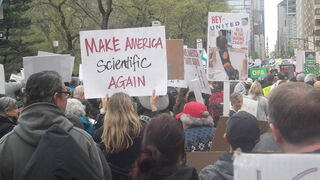Psychology
Liberal Privilege in Psychology
The dominance of psychology by liberals distorts psychological science.
Posted September 26, 2012
- I can avoid spending time with colleagues who mistrust me because of my politics.
- I can, if I wish, arrange to be in the company of colleagues who share my political views most of the time.
- I can be confident that the political beliefs I hold and the political candidates I support will not be routinely mocked by my colleagues.
- I can paint caricature-like pictures based on the most extreme and irrational of those who differ from me ideologically without feeling any penalty for doing so.
 Seen at the NYC March for ScienceSource: Lee Jussim
Seen at the NYC March for ScienceSource: Lee Jussim - I will feel welcomed and "normal" in the usual walks of my academic life.
- I can remain oblivious to the richly complex and nuanced views and values of those who hold very different political views than I do without feeling any penalty for such oblivion.
- I can easily find academic events which give attention primarily to people of my political persuasion.
- If I apply for a job, I can be confident my political views are more likely to be an asset than liability.
- I can be pretty confident that, if I present results at colloquia and conferences that validate my political views, I will not be mocked or insulted by my colleagues.
- I can arrange my professional activities so that I will never have to experience feelings of rejection owing to my politics.
- I can be pretty sure that my students who go on to academic jobs, and who share my political views, will be able to focus on being competent teachers and scientists, and will not have to worry about hiding their politics from senior faculty.
- I do not have to educate my students to be aware of the potential for systemic political bias against them, if they choose to perform studies that produce results seeming to support their political views.
- I can present research that is or merely appears to be consistent with my political orientation and be confident that I will not be the butt of sneering innuendos from colleagues.
- I can criticize colleagues' research that differs from mine on issues such as race, sex, or politics, without fear of being accused of being an authoritarian, racist, or sexist.
- I can systematically misinterpret, misrepresent, or ignore research in such a manner as to sustain my political views, confident that such misinterpretations, misrepresentations, or oversights are unlikely to be recognized by most of my colleagues.
- If I work in politically charged areas, such as race, gender, class, and politics, and if my papers, grants, or symposia are rejected, I need not ask each time if political bias led to the rejection.
- If I apply for a grant, or submit an article for publication, or propose a symposium, I can be pretty sure if my political beliefs have a subtle influence on my science, as long as I am not too obviously biased, they are more likely to be an asset than liability.
- I can be confident that if I write about "social justice" my colleagues will share the same moral and ideological assumptions about just what constitutes justice.
- I can be confident that the policy recommendations I conclude are justified on the basis of my research are likely to be supported by most of my colleagues.
- I can read the scientific journals pretty well-assured that my political beliefs will be upheld and validated by the "scientific" research.
- My professional culture gives me little fear about ignoring the perspectives and powers of people holding other ideological positions.
- I can criticize political bias in science without being seen as self-interested or self-seeking or biased myself.
- I will not have to worry whether citations to my scholarship and "impact factors" (often used as "objective" measures of influence and stature in a field for outcomes such as job offers, raises, and promotions) are artificially suppressed because most of my colleagues do not like the political implications of my work.
- If I use quality research methods, and my research identifies stereotyping, prejudice, and discrimination among my ideological opponents, I can be confident that the community of scholars will have a positive and receptive reaction to my research.
- I do not have to worry that reviewers and editors will require a higher standard to publish or fund my research than they require to publish or fund research with opposite ideological implications.
- In order to publish my research demonstrating moral failures or cognitive biases among those with very different ideological beliefs than mine, I will not need to consider camouflaging my results or sugarcoating the conclusions to avoid offending the political sensitivities of reviewers.
- I can be confident that vanishingly few of my colleagues will be publishing "scientific" articles claiming that people holding political beliefs like mine are particularly deficient in intelligence and morality.

A shorter list but longer scholarly article on these issues can be found here:
Jussim, L. (2012). Liberal privilege in academic psychology and the social sciences: Commentary on Inbar & Lammers (2012). Perspectives on Psychological Science, 7, 504-507.
This list was inspired by:
Inbar, Y. & Lammers, J. (2012). Political diversity in social and personality psychology. Perspectives on Psychological Science, 7, 496-503.
and
McIntosh, P. (1988). White privilege: Unpacking the invisible knapsack. Retrieved on 9-25-12 from: www.isr.umich.edu/resources/white-privilege.pdf


